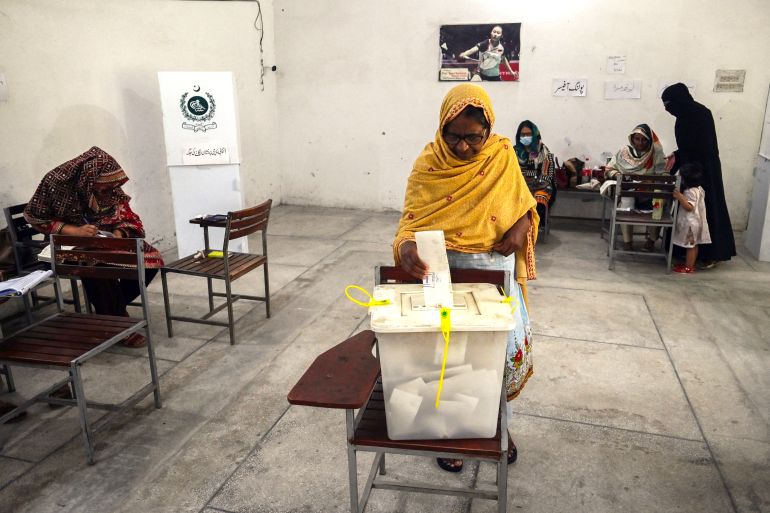Pakistan to hold general elections in last week of January, says poll panel
The elections, due to be held in November, are delayed due to the election commission’s fresh marking of constituencies.

Islamabad, Pakistan – Pakistan’s poll panel has announced the much-awaited general elections will be held in the last week of January next year.
In a short statement on Thursday, the Election Commission of Pakistan (ECP) said the polls, due to be held in November, were delayed due to fresh marking of the constituencies.
Keep reading
list of 3 itemsPakistan court extends ex-PM Imran Khan’s custody in ‘cipher’ case
The ‘tarnished legacy’ of Pakistan’s retiring top judge Umar Ata Bandial
A final list of new constituencies will be published by November 30 and the vote will take place late in January after a 54-day process that includes filing nomination papers, appeals and campaigning, the poll panel said.
The elections in the South Asian nation of 241 million residents were due after the outgoing parliament completed its five-year term in August. A caretaker government was then installed to supervise the vote.
According to Pakistan’s constitution, elections must be held within 60 days of the dissolution of the national or a provincial assembly on completing a full term, or within 90 days if the dissolution takes place earlier.
But days before the expiry of the outgoing government’s term, the then-Prime Minister Shehbaz Sharif approved the results of the country’s latest census, which is to be followed by the redrawing – or delimitation – of some constituencies.
The announcement of the election came as Pakistan grapples with severe economic, political and security crises.
In April last year, Imran Khan was removed as prime minister after he lost a parliamentary vote of no confidence. Khan and his Pakistan Tehreek-e-Insaf (PTI) party had been demonstrating seeking early elections since his removal.
As PTI held rallies across Pakistan to press for early polls, Khan and his party faced a massive statewide crackdown in May in which thousands, including Khan, were arrested.
Last month, Khan was arrested again in a corruption case and sentenced to three years in jail.
A high court suspended the sentence, but Khan remains in custody in the so-called “cipher” case, in which he is accused of making the contents of a confidential diplomatic cable public for political gains.
Khan says the diplomatic cable proves the United States colluded with the Pakistani military and his political rivals to remove him from power. Washington and the Pakistani military have denied the accusations.
Pakistan is also facing an economic meltdown, which has caused a balance-of-payments crisis and skyrocketed inflation in the country, which managed to avert a default in July after the International Monetary Fund approved a bailout package.
The global lender’s package came with strings attached, asking Pakistan to remove subsidies on fuel and power prices and to impose more taxes on people, resulting in nationwide protests.
Pakistan is also seeing a resurgence in violence by armed groups, mainly in the Khyber Pakhtunkhwa and Balochistan provinces.
Pakistan Taliban, an outlawed group of fighters also known by the acronym TTP and ideologically aligned with the Taliban in Afghanistan, has ramped up its activities and launched more than 300 attacks since the beginning of the year.